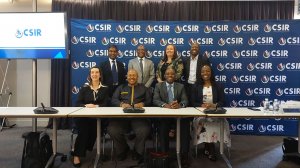The Council for Scientific and Industrial Research (CSIR) maintained a positive net margin for the 2023/24 financial year, exceeding R3-billion in revenue for the first time. However, the organisation’s declining parliamentary grant is a concern, said CSIR CEO Dr Thulani Dlamini at a media roundtable on November 18, discussing the CSIR’s performance for the 2023/24 financial year.
“Adequate support is essential for the organisation to fulfil its developmental mandate and maintain essential capabilities.”
From 2019/20 to 2023/24, the CSIR’s parliamentary grant reduced by 6%.
“This is in nominal terms. In real terms, the number is even bigger than that,” stressed Dlamini.
Operating in an environment where the economy is not growing and the fiscal is constrained impacts on the CSIR’s ability to remain sustainable in the long term and places a significant burden on the on the organisation.
“The cost of doing business is increasing and, therefore, we need to ensure that we bring our operating costs under control to remain financially sustainable as an organisation,” said Dlamini.
Positively, the CSIR’s total income increased by 15% over past five years in an economy growing at a rate below 2%.
During the 2023/24 financial year, the CSIR exceeded its turnover target of R3.05-billion, achieving a turnover of R3.179-billion. The organisation’s net margin was R36.7-million against a budgeted loss of R38.1-million.
“In terms of the diversification of the CSIR’s income, 59% of our income came from the public sector and 8% from the private sector, below our 11% target, but still higher than the previous financial year.”
International income streams accounted for 10% of the CSIR’s revenue, exceeding the organisation’s 9% target.
“We maintain financial sustainability within the CSIR in terms of income, but also in terms of our balance sheet. Our total operating income grew by 12% compared with the previous financial year. Our net profit, though, declined by 16% compared with the previous period. We continue to drive the diversification of our income streams through a concerted effort to grow our private as well as international income,” commented Dlamini.
He said the organisation performed admirably over the past financial year, meeting or exceeding 27 out of 31, or 87%, of its key performance indicators (KPIs). These KPIs range from new priority patent applications and the number of tech licence agreements signed to the number of reports contributing to national policy development.
“Per KPI, our performance is above 100% for the period,” Dlamini added.
While the number of patents granted to the CSIR declined by 24% over the past five years, since it launched its new strategy to intensify its impact on society, Dlamini advanced that the CSIR is not worried as the number of priority patent applications increased by 25% over the period, growing the number of technology demonstrators.
“Technology demonstrators are technologies that are close to commercialisation, close to exploitation by industry, government and society.”
Through a deliberate effort, as part of the CSIR’s new strategy, the organisation has increased the implementation of the technologies coming out of the CSIR by 108%, while the number of licence agreements signed, and joint technology development agreements signed, with industry, grew by 100% and 83%, respectively, over the past five years. The number of localised technologies has also grown by more than 200%.
“Our work is aligned with the priorities of government, particularly the National Development Plan, the 2019 White Paper on Science, Technology and Innovation, as well as other priorities that our government has set for our country. We need to ensure that we remain relevant whilst ensuring the long-term growth and sustainability of the organisation,” he stated at the roundtable, where he also emphasised that the CSIR is not a self-serving organisation.
“Our scientific and engineering capabilities must drive industrialisation development and the creation of a capable State and must drive outputs that contribute towards improving the social economic conditions of the people of South Africa.”
Edited by: Creamer Media Reporter
EMAIL THIS ARTICLE SAVE THIS ARTICLE
ARTICLE ENQUIRY
To subscribe email subscriptions@creamermedia.co.za or click here
To advertise email advertising@creamermedia.co.za or click here












